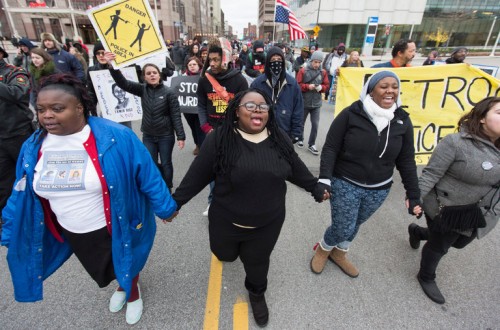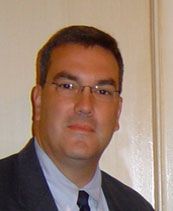More Police Officers Facing Charges, But Few See Jail
Share
Explore Our Galleries
Breaking News!
Today's news and culture by Black and other reporters in the Black and mainstream media.
Ways to Support ABHM?
By Shaila Dewan and Timothy Williams, the New York Times
What was once a rarity has now become increasingly common: police officers facing criminal charges in the deaths of civilians. In Albuquerque, two officers will stand trial in the death of a homeless man. In Cincinnati, a campus police officer has been charged in the fatal shooting of a man during a traffic stop. In Chicago, where a video captured the death of Laquan McDonald at the hands of the police, an officer was charged with murder.

Demonstrators in Cleveland on Tuesday, after a grand jury declined to indict police officers responsible for the shooting of Tamir Rice.
But even as high-profile police shootings have attracted more scrutiny over the past year, one thing remains clear: The law gives the police the benefit of the doubt.
That was the case on Monday, when a grand jury declined to indict two Cleveland police officers in the death of 12-year-old Tamir Rice.
The local prosecutor said the shooting of the boy as he played with a toy gun in a park was tragic but not criminal…
Though the Rice family and others criticized the report as biased toward law enforcement, many experts agreed that the law was on his side when he recommended against indictment.
And even as the number of police officers facing charges has notably risen, driven by video evidence and a national debate over law enforcement tactics, convictions have proved as elusive as ever…
Such legal realities leave a wide gap between an unnecessary police shooting and a criminal one, a gap that, barring a new Supreme Court ruling on police use of force, must be filled by better policies, training, accountability and supervision, experts say.
“These are important policy discussions that need to be addressed,” said Philip M. Stinson, a criminal justice professor at Bowling Green State University in Ohio and a former police officer. “We have a problem with police subculture. We have a problem with poor training, lack of training. Many police departments have cut in-service training because of budget cuts. Many departments used to send everybody every month, but now they don’t have the money to do that.”
Despite heavy sanctions, like millions paid out in settlements over police mistakes, police departments have resisted change, Mr. Stinson said. “But it’s gotten to the point now where people of all walks of life are paying attention. We’ve gotten to a tipping point.”
William Johnson, the executive director of the National Association of Police Organizations, had a broader view of how to bridge the gap.
“The anger on the part of protesters is misguided if it’s focused on the grand jury,” he said. “If they want change, what they need to look at is training, on the part of officers, but also training on the part of the community to understand how the criminal justice system does work. And also in, I don’t know how to put it, but common sense on the part of the public.”…
This year, 18 police officers were charged in fatal on-duty shootings, compared with an average of fewer than five a year over the preceding decade, according to Mr. Stinson’s research. That does not include the six officers indicted in the nonshooting death of Mr. Gray. Of the 18, 11 of the cases involved some sort of video evidence, Mr. Stinson said, adding, “In some of these cases, I don’t think the officers would have been charged without it.”…
Even with indictments, juries will remain reluctant to convict police officers absent evidence of malice, said Eugene O’Donnell, a former officer and prosecutor who now teaches at the John Jay College of Criminal Justice in New York. “Tremendous incompetence, the worst kind of training, disregard for people is really not enough,” he said. “You’re going to have to go beyond that because the police are different.”
Some jurors in police cases have later made a distinction between determining whether the officer should have fired and deciding — as the law instructs — whether the officer could reasonably have feared bodily harm.
Read the full article here.
Read more Breaking News here.










Comments Are Welcome
Note: We moderate submissions in order to create a space for meaningful dialogue, a space where museum visitors – adults and youth –– can exchange informed, thoughtful, and relevant comments that add value to our exhibits.
Racial slurs, personal attacks, obscenity, profanity, and SHOUTING do not meet the above standard. Such comments are posted in the exhibit Hateful Speech. Commercial promotions, impersonations, and incoherent comments likewise fail to meet our goals, so will not be posted. Submissions longer than 120 words will be shortened.
See our full Comments Policy here.